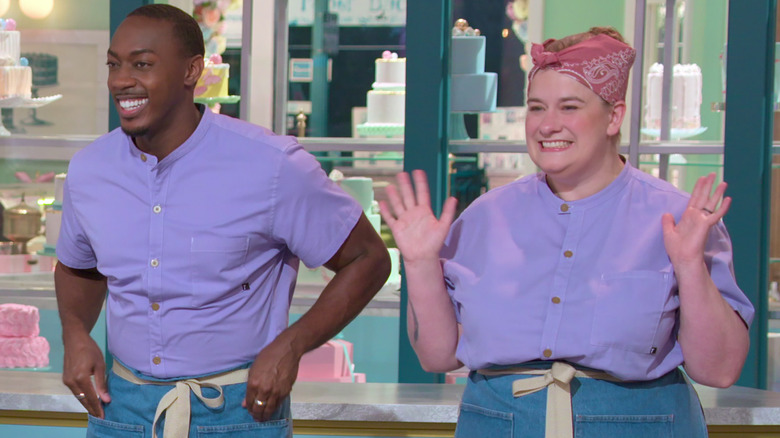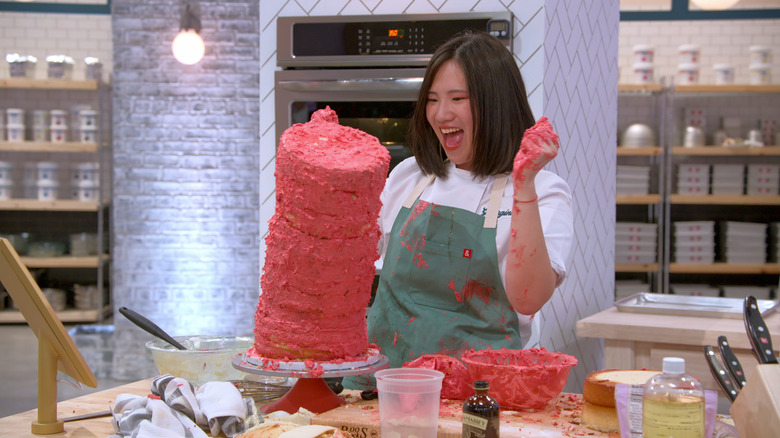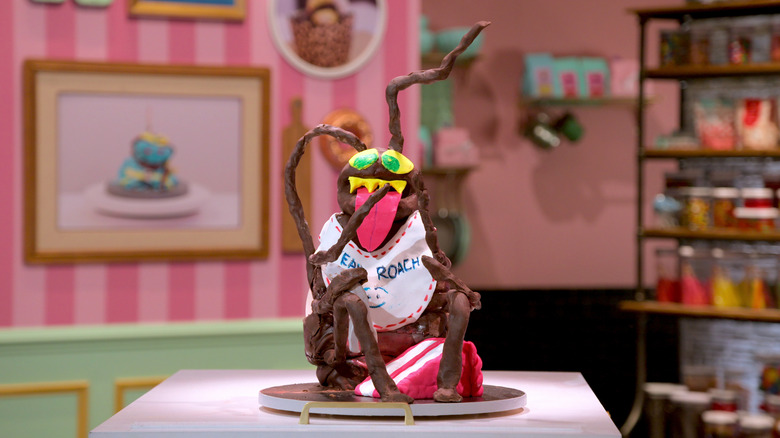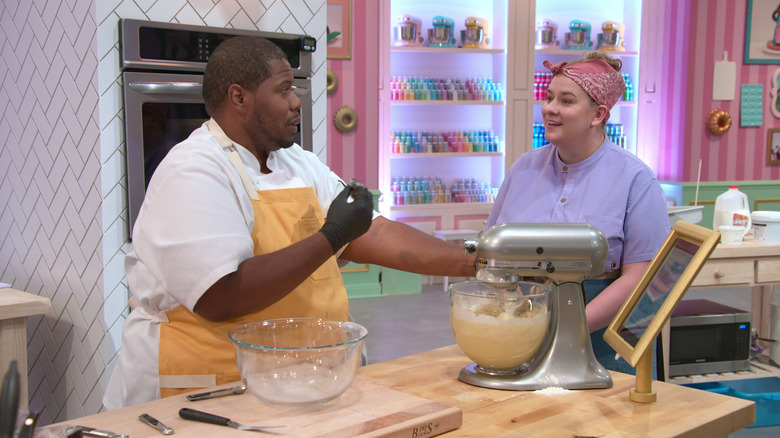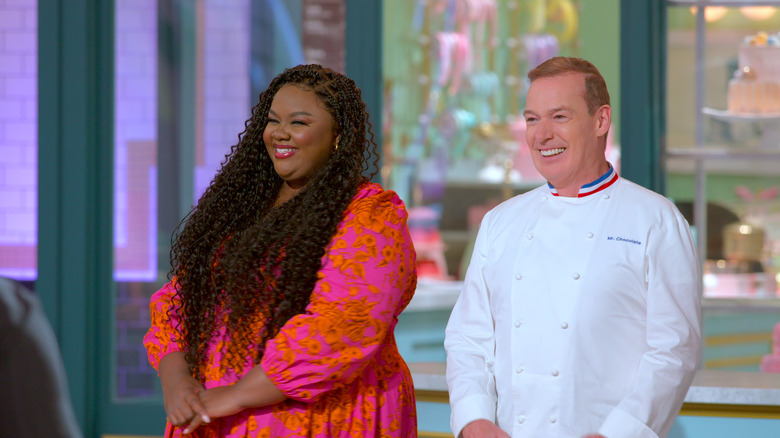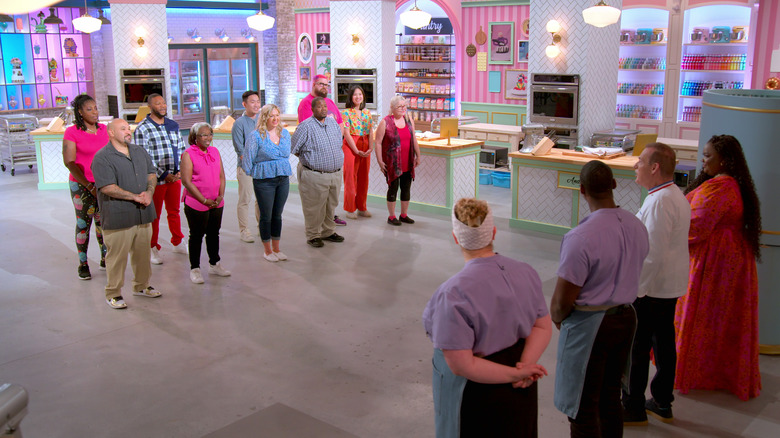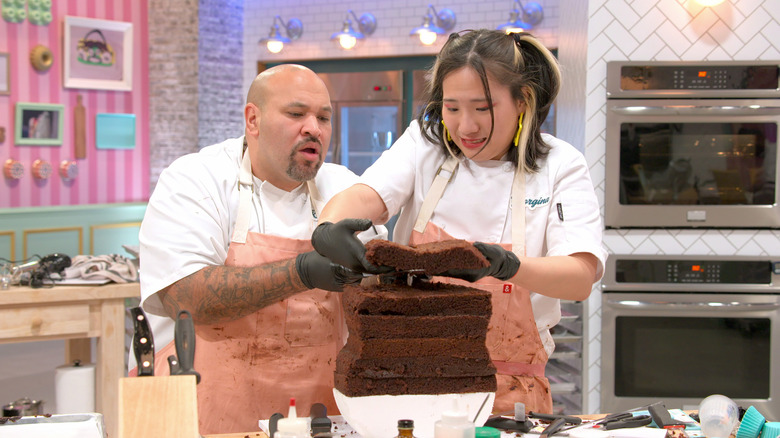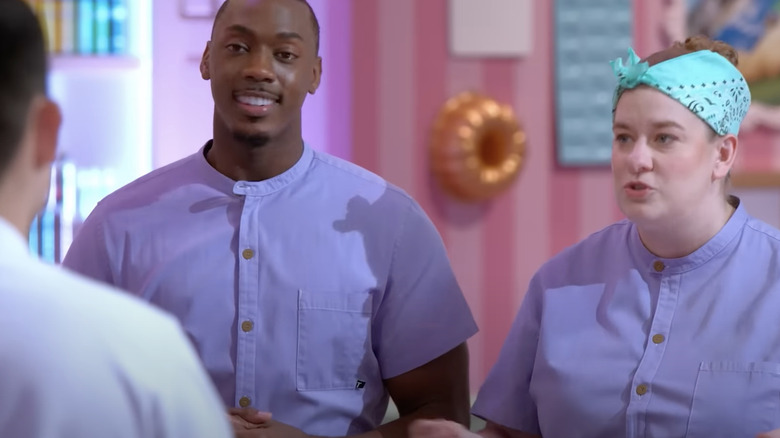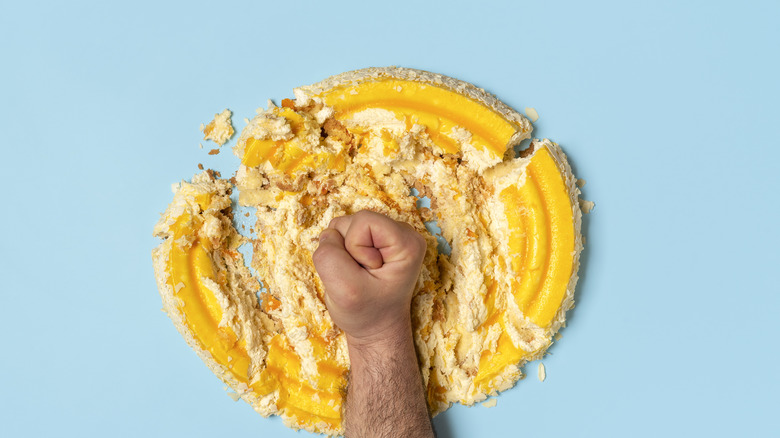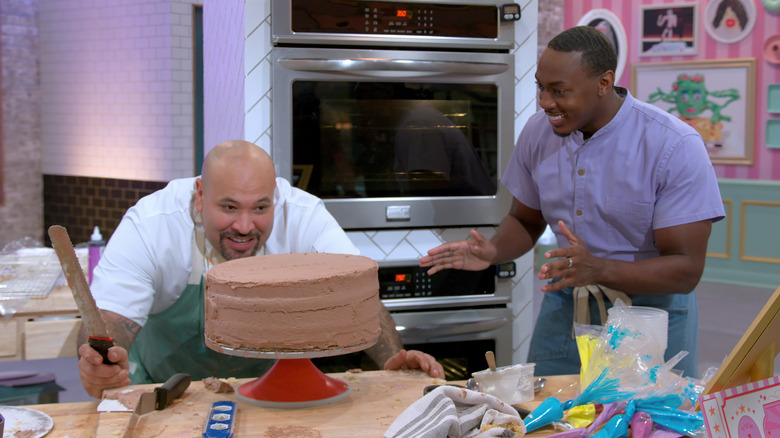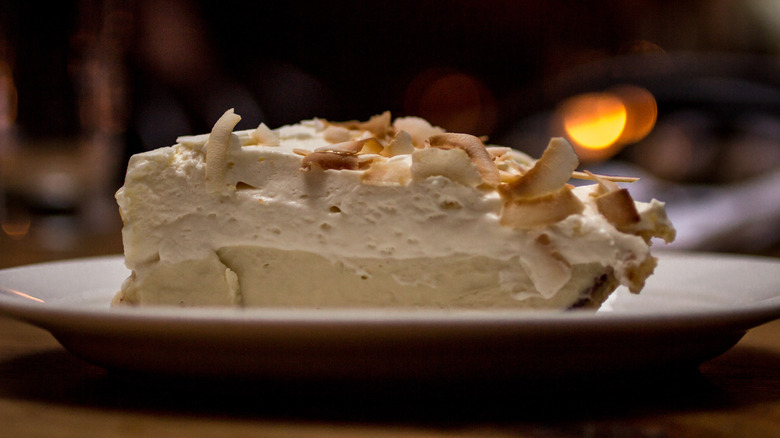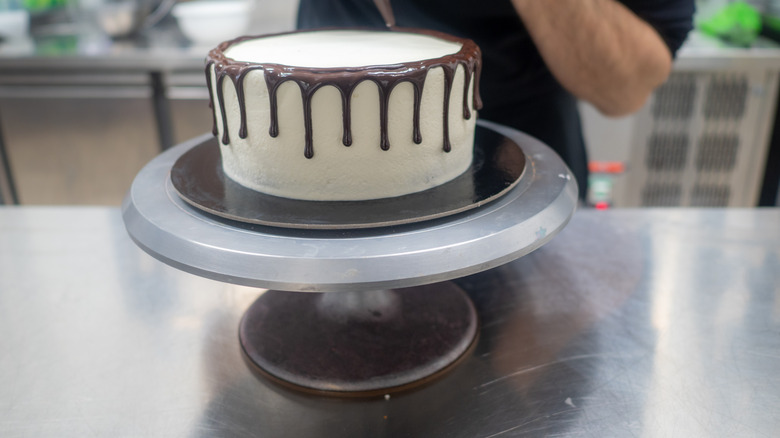Erin Jeanne McDowell And Robert Lucas Tell Everything About The Big Nailed It Baking Challenge - Exclusive Interview
Fans of the popular Netflix cake competition show "Nailed It!" have a new version to look forward to: "The Big Nailed It Baking Challenge." The new show adds a fun wrinkle to the "Nailed It!" formula: It stars 10 contestants, who are trying to learn how to take their baking skills to an expert level. Each of the 10 episodes brings new challenges (and new eliminations), and at the end, a single baker emerges victorious.
Nicole Byer and Jacques Torres return to host and judge the show, and they bring along two new faces: Erin Jeanne McDowell and Robert Lucas. McDowell and Lucas serve as expert coaches, sharing their skills with the baker-contestants. McDowell is a pastry chef, cookbook author, and host of the YouTube show "Bake It Up A Notch;" Lucas is a cake decorator with millions of followers on TikTok and YouTube. In an exclusive interview with Mashed, they talked about their experience filming the show and shared some useful baking tips.
The bakers had a a hard time at first
Were there any memorable cake fails early on?
Erin Jeanne McDowell: Whew. Yeah, especially at the beginning, right, Robert?
Robert Lucas: Yeah. In the beginning, everyone's structure was a little off, but it was always a fun thing to see them learn.
You had a lot of collapsing cakes in the beginning?
McDowell: For sure. It was fun to see though, because they had that whole transformation after. That was the whole point: instead of giving you a really difficult challenge, [we want] to see what happens if we also teach you along the way. The first episodes though, I don't want to speak for Robert, but it was so hard for us at the beginning. The first two episodes, we were like, "We want to help so much," but there was still a lot to learn.
Lucas: We both fell into that "I want to go over there and help them so bad" mode, but you have to let them fail a little bit, because they need to learn from those failures. They did, because as it went on, they definitely improved.
McDowell: They didn't know how to use spatulas at the beginning. Some of them were applying frosting with their hands, and you can see some of that in the trailer, and we were like, "They've got a lot to learn."
Eventually the contestants came up with inventive cake flavors
Were you impressed by how much they improved over the course of the series?
Lucas: Yeah. Everyone improved, not just with design, but with flavors and experiments too. What they thought would work well, sometimes that didn't always work the best, but sometimes it did. Not only were they able to learn about the aesthetics of making it look nice, but they were also thinking about how it tasted.
McDowell: It was cool to see, as their skills started to improve, that they were able to exercise their creativity. That's one of my favorite parts about baking, is that you can be so creative with it, and professionals like Robert and I know how to do that, but sometimes the people at home don't know how to do that. They don't know how to make it their own or create their own thing.
The more tools we gave them, the more you got to see their ideas come out. As Robert said, sometimes their ideas worked, or sometimes there was a lesson to be learned in that. For the most part, it was cool, and the more they learned, the better they were able to execute their own ideas. That was one of the most rewarding parts of the process to watch.
Were there any flavors that they came up with that surprised you, that you thought were really cool that you might use in your own baking?
Lucas: The only one that surprised me was red velvet and strawberry, because that was a combination you don't hear often. Now that I think about it, I'm like, "No, that actually works because that's chocolate and strawberry."
McDowell: I was surprised that sometimes they kept coming back to the same flavors. They didn't nail it the first time, so they were like, "I'm going to get it again." I was surprised that one time I was like, "Oh boy, here we go again with that same thing," but they did finally get it right. I was a little surprised. I might keep trying different things, but I also thought that was awesome that they were like, "No, I'm really going to show the coaches and the judges that I understand this now."
Robert and Erin have complimentary skillsets as coaches
Do you think it was more difficult to teach them the cooking side or the decorating side?
Lucas: Both, and me and Erin together, it's such a perfect pair because she knows a lot more about the baking and —
McDowell: And he knows so much more about the decorating. It was like we could come together and say to them, "Okay, okay."
Lucas: Yeah, it was such a good pair. From both ends, not only do you want the cake to look good, but it also has to taste good because at the end of the day, you're going to eat it. Regardless of how good it looked, if you took a bite of it and you weren't the happiest with it, that didn't really show improvement in those aspects. We both really had to hone in, you have to get both of these things in order to make a great cake.
McDowell: Sometimes the flavor was totally there, but it looked not so great. You eat with your eyes first, and we do need it to taste good, too. One of the proudest moments for me in the whole series was when Jacques Torres said, "We finally have good cake." When I saw it in the trailer, I got goosebumps.
The joys of working with Jacques Torres and Nicole Byer
Is Jacques Torres somebody that you looked up to when you were learning how to do pastry and cake? How was it with him on set? Did you learn anything from him?
Lucas: Tempering chocolate, that's always something I'm going to remember. He's such an amazing person.
McDowell: He was amazing to work with, and he was so generous with his knowledge with the bakers and also with Robert and me. I was just saying to somebody the other day how much Robert and I learned during Jacques' chocolate episode. He gave some lessons and I felt like I was basically one of the students in the show for that episode. It was a lot of fun. If you had told 14-year-old Erin that she would be working with Jacques Torres ... When I decided I was going to go to pastry school, he was definitely someone I looked up to. It was a lot of fun to be with him.
I'm a fan girl of Nicole Byer. It was the whole experience of working with them on a show that already existed, but a new one too, something that was different and that built on what was fun about "Nailed It!" It was a blast.
Is it tough to keep up with Nicole's comic timing? Does she keep everyone cracking up even when the cameras aren't on?
Lucas: Yeah, she's such a good person. Being a comedian, I know you see it on TV and it's funny, but even when the cameras are off, constantly you're laughing and having a good time. That was such a good work environment to be in, having such an amazing cast to be with. It was so much fun.
McDowell: She sometimes would say a joke and I would still be laughing about it, but she would already be onto the next line. That was like, "She's such a pro because she could deliver it and then just keep going." I would sometimes be laughing and laughing and she was always cracking us up. I said it to Robert a million times when we were working on it, but I had such a blast working with him specifically.
We were together so much practicing these baking 101 demos and doing all these things. We had this little room where we would sit when we were filming and we would pull the curtain back so that we could talk about our snacks and the different things that we were doing. As much fun as you're going to see when you watch the show, it was that much fun times 10 making it, for sure.
The difference between Baking Challenge and the original Nailed It!
Do you have a favorite on-set story that didn't make it onto the show?
McDowell: One thing that is fun was in one of the very last episodes, everybody gets to get dressed up. I won't reveal any more than that, but it looked like Jacques and Nicole were going to the prom and we were taking all these prom pictures backstage of them all dressed up. That was a lot of fun. You'll see that moment when you watch the show, but you won't see the prom moments backstage.
For fans of the original "Nailed It!" what's new and exciting about the "Baking Challenge?"
Lucas: Just like the original "Nailed It!" it's following that same scope, but the viewers are now going to be able to learn a lot more. This one's entertaining as well as informative, so you're going to get to learn so much more, but you're also going to get a really good laugh at the whole situation too, because it's a very lighthearted fun show to watch. Getting to be attached to the cast and all the bakers there, because they're not rotating out like regular "Nailed It!" you're really getting to follow along with their stories.
McDowell: Netflix does a great job of telling stories. This is a competition show, but if you watch all the way through, it's a really beautiful story, too.
The contestants helped each other out
Was it tough having to see one of your students get eliminated every week?
McDowell: I would cry.
Lucas: It was tough, but yeah, Erin took it so much worse than I did, emotionally.
McDowell: We both did feel though, even when they went home, everyone got something out of it. That's what I always felt, because they had learned all the lessons up to that point. It wasn't as sad as it often can be, but you wanted to keep teaching and you wanted to keep going. I cried five or six times over the course of filming the show, and they would be saying, "This is a happy show." I was like, "I am happy, I love them so much."
Did the atmosphere get competitive on set?
Lucas: It was competitive, but in the moment everyone's helping. Even though they're focused on their own things, they will help the next person if they can or give them tips or how they did something, which I thought was really great. It showed the heart of everyone on the show, that they're focused on what they're doing, but they do not mind helping because everyone got along so well.
McDowell: They did, they helped each other. Sometimes they would lend each other oven space or there were several times that somebody finished a few minutes early and would help somebody else. That was really cool to see. They definitely were competing and you'll see that they bring that energy for sure. They did care about each other, so it was competitive with love.
The difference between teaching on YouTube and in-person
You both make educational content on YouTube. How is it different when you're coaching people in person versus making videos about it?
Lucas: The hardest part is that I always want to be hands-on and say "No, do it this way." On the show, I teach you and I hope you listen and I hope you're able to learn what was taught to you. The toughest part was to stand back and see them do something like that wasn't quite right, and you can't really do anything about it, but it was still fun to see how they handled certain situations.
McDowell: It was a building block situation. In the very first episode, you're going to see some of the funniest disasters, because they hadn't had those building blocks taught to them yet and we keep building as we go along. That was, by far, the hardest thing. I wanted to be saying things in the very first episode that I knew we were going to teach them in Episode 2 or 3. I wanted so badly to help, but sometimes, you learn a lot from your mistakes.
That was one of the things they thought about so well in this. These bakers needed to make some mistakes in order to also improve. We all have our baking mistakes, and Robert and I talked about that a lot behind the scenes — our worst moments, because that happens to everybody, but then there's a lot to learn from that stuff, too.
Robert and Erin remember their worst baking fails
Can you share a baking fail that still haunts you?
McDowell: Mine is chocolate related, which is why when it was time to learn from Jacques, I was all ears. Once, when I was 16 years old, I kept melting chocolate over and over again in the microwave. I didn't realize it retains a lot of heat. Eventually, the bowl exploded and ignited, and it was my worst disaster. It exploded, it went everywhere. Chocolate all over the microwave, chocolate everywhere, and it definitely still haunts me to this day.
Lucas: My worst was a cake that I was working on, and I was going to get ingredients and as I walked back, I tripped and I had to catch myself and my hand went through the cake. That was the worst one.
McDowell: Were you filming when it happened? That's what I want to know.
Lucas: No, it was off-camera, and I couldn't even share the video because it was ruined at that point.
McDowell: That probably would've gone viral if you had shared it.
The benefits (and challenges) of teaching yourself how to bake
Robert, how does it feel to be an expert coach only three or four years after you baked your very first cake?
Lucas: It was very fun to be able to do this, and I was very proud that I was even able to do it. I wanted to do this because I was self-taught. These bakers coming in that didn't have much knowledge about how to do this, I was able to show that you can do this, you can teach yourself or you can have others teach you and you don't have to have 10, 20 years of experience. I'm like, "Maybe I'm that ray of hope that if he was able to do it, maybe I can do it as well." That's why I'll always enjoy sharing my story to help motivate someone who feels like maybe they don't have the experience. It may take a little time, but you can get there.
Do you wish that you had an expert coach when you were first learning how to make cakes, or do you really value going through it alone?
Lucas: Having someone there is definitely beneficial, but I want to figure things out, because that is how I learn the best. That's how I've done every cake that I've ever done. Every time I make something, I learn from what I did and I apply it to the next time I make it. I had fun in that sense of doing it, but would it be helpful to have someone there? Definitely.
Tips for custard pies
This one is for Erin and it's a bit of a curveball because it's not about cake: It's summer pie season and you wrote the book about pie, so I'm wondering what seasonal pies you're really amped about right now.
McDowell: That's actually also a little fun behind-the-scenes moment from "Nailed It.!" I made pies for the whole crew. I made 22 pies on the weekend and brought them in so that everyone could eat some pie. I tried to ask everyone their favorite flavors and we filmed it in the summer, so there were a lot of requests for blueberry and peach and all of those, but a good cream pie in the summer is really good.
We taught them how to make different fillings for cakes like pastry cream and lemon curd. Those are the same things you would use to make a lemon meringue pie or a coconut cream pie. You would use those same custards. That was fun — on the outside, I was talking about cake, but on the inside, I was also like, "You don't even know this, but you could also use this for pie."
Do you have any tips for success with those cream and custard fillings?
McDowell: One of the biggest things is making sure that everything cools down enough. People sometimes want to rush through the process of pie and cake and all of the things we taught them on "Nailed It!" and patience is key. Let things cool down. If you pour a hot custard into a pie crust, it can sog it out.
One of the things I also think was really interesting with these bakers in this show was that even some of the ones that came with a little bit more baking experience, they hadn't necessarily worked with all that top-tier equipment before. The kitchen that they were working in had great ovens and everything that they could need. You see this moment in the trailer of somebody stirring two pots at the same time because they're like, "Look, I actually can do that here."
It's funny because I was going to say that my best tip for pies is patience. That was some of my best advice for these bakers, even though sometimes they were under a time limit. They had to simultaneously be working quickly and smart, but also have that patience.
The tools you need to start baking and decorating cakes
For people who are looking to get into serious cake baking and decorating, what materials, tools, or special ingredients should they invest in to get started?
Lucas: For decorating, you want to make sure that you have that turntable. That's one of the key things to making a cake. You have to have the turntable as well as something to smooth the cake out, which would be a cake comb and an offset spatula. If you have those three things, that's going to be the base of a great cake. From there, you can build upon that.
McDowell: Even though I'm not as intense of a decorator, the turntable is by far one of my favorite things that I own in my kitchen. It's one of those things that a lot of new bakers think is an extra tool, but you really need it, you will use it. I also always tell people to get started with a really good set of mixing bowls. I use metal bowls because they're heat safe. You could use those in a lot of different situations and getting a set of different sizes is one of the things. When you're really serious about baking, people are always needing one more bowl. Get yourself a nice set from the start so that you're committed to it now.
"The Big Nailed It Baking Challenge" premieres on Netflix Friday, August 4.
This interview has been edited for clarity.
